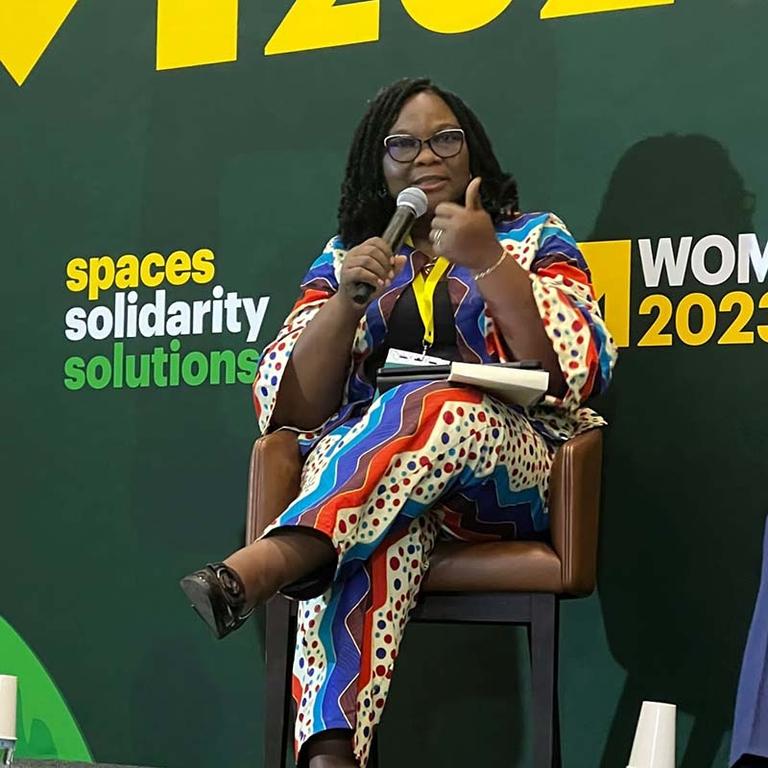
Global Conversations: Tackling Child Marriage
Dr. Modupe Taiwo, a 91�ֿ� program director in Sierra Leone, leads “My Body. My Decision. My Rights,” a project funded by Global Affairs Canada to reduce and respond to child marriage. She joined other global leaders at this year’s , July 17 -20, in Kigali, Rwanda, for an intergenerational discussion on the urgent need to .��
Dr. Taiwo shared her reflections from the conversation, as well as her work in adolescent sexual and reproductive health and how it intersects with 91�ֿ�’s Ending Child Marriage project, funded by our 100 Strong women’s philanthropic network.
Q. 1. The last Women Deliver conference was in 2019, and obviously much has changed since then. Now we face a deepening “polycrisis” of conflict, climate change, food insecurity and COVID-19, and it’s threatening hard-won progress toward ending child marriage. How do you see these troubling factors at play in Sierra Leone?
Dr. Taiwo: Sierra Leone is one of the poorest countries in Africa with a population of 7.8 million.�� Like other countries, Sierra Leone is affected by the polycrisis with significant impact on the practice of child marriage. In June 2023, food inflation was 56%, resulting in a massive reduction in household purchasing power. Many households, especially in rural communities, live in poverty.��
Many slums are springing up in urban areas with an increasing number of people living in deplorable conditions, exposed to flooding, mudslides, fires and other disasters. ��
Research has linked continuity in the practice of child marriage to poverty. A baseline report in 2021 revealed that a family with at least five daughters is five times more likely to agree to marrying off their daughters as a debt repayment.
My impression is that we have made significant progress in addressing child marriage with increased knowledge among adolescents, parents, caregivers and other key influencers. But in view of the slow pace of social norms change, a longer-term investment is required to sustain the early gains and prevent regression.
Q. 2.�� What are the approaches and interventions we need now to keep up momentum?
In previous and current interventions, we’ve used the following strategies (dependent on the investment available):
- Explored the root causes of child marriage in communities.
- Engaged communities to explore their own perceptions of girls’ rights, parenting and child marriage.
- Mapped the relevant root causes, stakeholders and systems drivers.
- Run holistic, multifaceted, community-driven and community-actioned programs to address the root causes of child marriage.
- Focused on financial literacy and economic empowerment for adolescent mothers.
- Engaged families, parents, adolescent girls and communities (including community and religious leaders) in the fight against child marriage and discriminatory and harmful social norms.
- Engaged with critical government stakeholders to strengthen the systems that prevent and address child marriage.��
Learning from these strategies and scaling up child rights advocacy in alignment with the UN Convention on the Rights of the Child would offer a renewed impetus for sustaining the momentum in the fight against child marriage.
Q. 3. Would you share a few thoughts on the 100 Strong Ending Child Marriage (ECM) project and its potential impact – in Sierra Leone and more broadly?�� ��
��
The ECM project is showing great success by incorporating all the above-mentioned strategies. It is also building on the work we’re doing through the Global Affairs Canada project to support girls’ rights and empowerment. In Kailahun, a rural area where the ECM project is being implemented, we’re seeing evidence of local ownership as paramount chiefs commit to enforcing new district-level bylaws against sexual and gender-based violence.
It's wonderful to see that a Community Action Group in Bandajuma community (Yawei Chiefdom) – established through the ECM project – has inspired the formation of four similar groups in communities outside the project area. To continue mobilization, these new groups have set up “Osusu” (small weekly contribution by members), which they use for outreach.
Girl champions are also speaking out against child marriage and sharing their stories with peers to encourage parents to send their girls to school or continue their schooling. Best of all, some of the champions (child brides and young husbands) have been able to go back to school and transition to college; some have started small businesses.
Q.4. Finally, as you reflect on Women Deliver 2023, what gives you hope that ending Child, Early and Forced Marriage and Unions is achievable?
There is renewed hope as most donors have committed to continue funding prevention initiatives in Africa and Asia. In Sierra Leone, it’s encouraging to see change beginning to take root in Kailahun district. The bylaw is a strong starting point for ending child marriage at the district level. A key next step for 91�ֿ� is to share this success with government decision makers to gain their support for passing the national Childs Rights Bill, which now includes a provision on ending child marriage.
Meanwhile, people in Kailahun are seeing positive changes as girls return to school, start businesses, become activists, and gain the ability to meaningfully contribute to their families and communities. Local leaders speak of greater cohesion and peace, as well as a reduction in gender-based violence. Community members are taking action to report incidents, hand over perpetrators to the law and support survivors.
What’s equally exciting is that evidence from this project will inform our efforts to end child marriage beyond the Kailahun district – throughout Sierra Leone and in other countries.
We invite you to learn more about our��Ending Child Marriage Project in Sierra Leone��and consider joining us as a supporter!
